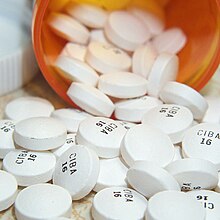
Back استخدام من دون تصريح Arabic Ús en indicació no autoritzada Catalan بەکارھێنان بەبێ پێداچوونەوە CKB Off-Label-Use German Uso fuera de indicación Spanish استفاده بدون مجوز Persian Lääkkeen poikkeuskäyttö Finnish Off-label gyógyszeralkalmazás Hungarian Off-label Italian 適応外使用 Japanese
| Regulation of therapeutic goods in the United States |
|---|
 |
|
Prescription drugs Over-the-counter drugs |
Off-label use is the use of pharmaceutical drugs for an unapproved indication or in an unapproved age group, dosage, or route of administration.[1] Both prescription drugs and over-the-counter drugs (OTCs) can be used in off-label ways, although most studies of off-label use focus on prescription drugs.
Off-label use is very common and generally legal unless it violates ethical guidelines or safety regulations. The ability to prescribe drugs for uses beyond the officially approved indications is commonly used to good effect by healthcare providers. For example, methotrexate is commonly used off-label because its immunomodulatory effects relieve various disorders.[2] However, off-label use can entail health risks and differences in legal liability. Marketing of pharmaceuticals for off-label use is usually prohibited.
- ^ Randall S. Stafford (2008). "Regulating Off-Label Drug Use — Rethinking the Role of the FDA". N Engl J Med. 358 (14): 1427–1429. doi:10.1056/NEJMp0802107. PMID 18385495.
- ^ Briem, S; et al. (2011), "[Current "off label use" of methotrexate for chronic inflammatory rheumatic diseases]", Z Rheumatol, 70 (2): 123–128, doi:10.1007/s00393-010-0685-2, PMID 21267732.
© MMXXIII Rich X Search. We shall prevail. All rights reserved. Rich X Search